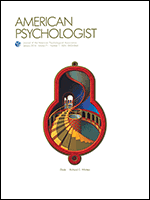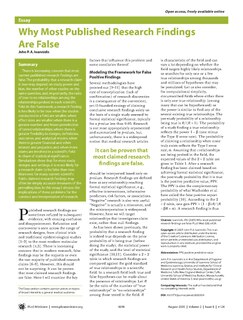
Psychology is the scientific study of mind and behavior. Psychology includes the study of conscious and unconscious phenomena, including feelings and thoughts. It is an academic discipline of immense scope, crossing the boundaries between the natural and social sciences. Psychologists seek an understanding of the emergent properties of brains, linking the discipline to neuroscience. As social scientists, psychologists aim to understand the behavior of individuals and groups. Ψ (psi), the first letter of the Greek word psyche from which the term psychology is derived, is commonly associated with the science.

A psychologist is a professional who practices psychology and studies mental states, perceptual, cognitive, emotional, and social processes and behavior. Their work often involves the experimentation, observation, and interpretation of how individuals relate to each other and to their environments.

Applied psychology is the use of psychological methods and findings of scientific psychology to solve practical problems of human and animal behavior and experience. Educational and organizational psychology, business management, law, health, product design, ergonomics, behavioural psychology, psychology of motivation, psychoanalysis, neuropsychology and in psychiatry the mental health, and are just a few of the areas that have been influenced by the application of psychological principles and scientific findings. Some of the areas of applied psychology include counseling psychology, industrial and organizational psychology, engineering psychology, occupational health psychology, legal psychology, school psychology, sports psychology, community psychology, neuropsychology, medical psychology and clinical psychology, evolutionary psychology, human factors, forensic psychology, traffic psychology. In addition, a number of specialized areas in the general area of psychology have applied branches. However, the lines between sub-branch specializations and major applied psychology categories are often mixed or in some cases blurred. For example, a human factors psychologist might use a cognitive psychology theory. This could be described as human factor psychology or as applied cognitive psychology. When applied psychology is used in the treatment of behavioral disorders there are many experimental approaches to try and treat an individual. This type of psychology can be found in many of the subbranches in other fields of psychology.

APA style is a writing style and format for academic documents such as scholarly journal articles and books. It is commonly used for citing sources within the field of behavioral and social sciences, including sociology, education, health sciences, criminal justice, and anthropology, as well as psychology. It is described in the style guide of the American Psychological Association (APA), which is titled the Publication Manual of the American Psychological Association. The guidelines were developed to aid reading comprehension in the social and behavioral sciences, for clarity of communication, and for "word choice that best reduces bias in language". APA style is widely used, either entirely or with modifications, by hundreds of other scientific journals, in many textbooks, and in academia. The current edition is its seventh revision.

School psychology is a field that applies principles from educational psychology, developmental psychology, clinical psychology, community psychology, and behavior analysis to meet the learning and behavioral health needs of children and adolescents. It is an area of applied psychology practiced by a school psychologist. They often collaborate with educators, families, school leaders, community members, and other professionals to create safe and supportive school environments.

The Doctor of Psychology is a professional doctoral degree intended to prepare graduates for careers that apply scientific knowledge of psychology and deliver empirically based service to individuals, groups and organizations. Earning the degree was originally completed through one of two established training models for clinical psychology. However, Psy.D. programs are no longer limited to Clinical Psychology as several universities and professional schools have begun to award professional doctorates in Business Psychology, Organizational Development, Forensic Psychology, Counseling Psychology, and School Psychology.

Clinical psychology is an integration of social science, theory, and clinical knowledge for the purpose of understanding, preventing, and relieving psychologically based distress or dysfunction and to promote subjective well-being and personal development. Central to its practice are psychological assessment, clinical formulation, and psychotherapy, although clinical psychologists also engage in research, teaching, consultation, forensic testimony, and program development and administration. In many countries, clinical psychology is a regulated mental health profession.

Community psychology is concerned with the community as the unit of study. This contrasts with most psychology which focuses on the individual. Community psychology also studies the community as a context for the individuals within it, and the relationships of the individual to communities and society. Community psychologists seek to understand the functioning of the community, including the quality of life of persons within groups, organizations and institutions, communities, and society. Their aim is to enhance quality of life through collaborative research and action.

Health psychology is the study of psychological and behavioral processes in health, illness, and healthcare. The discipline is concerned with understanding how psychological, behavioral, and cultural factors contribute to physical health and illness. Psychological factors can affect health directly. For example, chronically occurring environmental stressors affecting the hypothalamic–pituitary–adrenal axis, cumulatively, can harm health. Behavioral factors can also affect a person's health. For example, certain behaviors can, over time, harm or enhance health. Health psychologists take a biopsychosocial approach. In other words, health psychologists understand health to be the product not only of biological processes but also of psychological, behavioral, and social processes.

American Psychologist is the flagship peer-reviewed academic journal of the American Psychological Association. The journal publishes timely high-impact articles of broad interest. Papers include empirical reports and scholarly reviews covering science, practice, education, and policy. Current editor-in-chief is Harris Cooper, PhD.
The scientist–practitioner model, also called the Boulder Model, is a training model for graduate programs that provide applied psychologists with a foundation in research and scientific practice. It was initially developed to guide clinical psychology graduate programs accredited by the American Psychological Association (APA).
Richard C. Waites, J.D., Ph.D.,, a noted board certified trial attorney and social psychologist, is an internationally recognized expert in jury and courtroom decision maker research, a field he helped to develop and that he continues to advance.

Sport psychology was defined by the European Federation of Sport in 1996, as the study of the psychological basis, processes, and effects of sport. Otherwise, sport is considered as any physical activity where the individuals engage for competition and health. Sport psychology is recognized as an interdisciplinary science that draws on knowledge from many related fields including biomechanics, physiology, kinesiology and psychology. It involves the study of how psychological factors affect performance and how participation in sport and exercise affect psychological and physical factors. Sport psychologists teach cognitive and behavioral strategies to athletes in order to improve their experience and performance in sports. In addition to instruction and training of psychological skills for performance improvement, applied sport psychology may include work with athletes, coaches, and parents regarding injury, rehabilitation, communication, team building, and career transitions.

Psychology encompasses a vast domain, and includes many different approaches to the study of mental processes and behavior. Below are the major areas of inquiry that taken together constitute psychology. A comprehensive list of the sub-fields and areas within psychology can be found at the list of psychology topics and list of psychology disciplines.
Everett Lowell Kelly was an American clinical psychologist, professor of psychology at the University of Michigan, president of the American Psychological Association (1954–55), and chairman of the Executive Committee for the Boulder Conference on Graduate Training in Clinical Psychology (1948–49).

The replication crisis is an ongoing methodological crisis in which it has been found that the results of many scientific studies are difficult or impossible to reproduce. Because the reproducibility of empirical results is an essential part of the scientific method, such failures undermine the credibility of theories building on them and potentially call into question substantial parts of scientific knowledge.

Janet E. Helms is an American research psychologist known for her study of ethnic minority issues. A scholar, author and educator, she is most known for her racial identity theory that is applied to multiple disciplines, including education and law. She received the 2006 Award for Distinguished Contributions to Education and Training in Psychology from the American Psychological Association.
Indian psychology refers to an emerging scholarly and scientific subfield of psychology. Psychologists working in this field are retrieving the psychological ideas embedded in indigenous Indian religious and spiritual traditions and philosophies, and expressing these ideas in psychological terms that permit further psychological research and application. 'Indian psychology' in this sense does not mean 'the psychology of the Indian people', or 'psychology as taught at Indian universities'. The Indian Psychology Movement refers to psychologists encouraging or carrying out the recently expanded activity in this field.

Coaching psychology is a field of applied psychology that applies psychological theories and concepts to the practice of coaching. Its aim is to increase performance, self-actualization, achievement and well-being in individuals, teams and organisations by utilising evidence-based methods grounded in scientific research. Coaching psychology is influenced by theories in various psychological fields, such as humanistic psychology, positive psychology, learning theory and social psychology.






